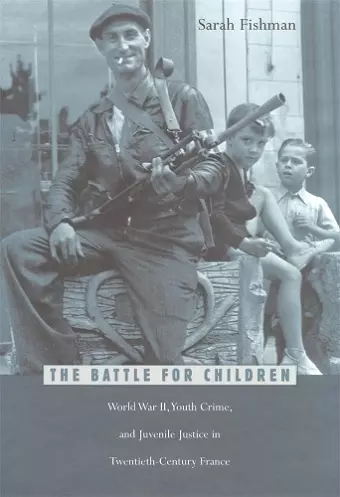The Battle for Children
World War II, Youth Crime, and Juvenile Justice in Twentieth-Century France
Format:Hardback
Publisher:Harvard University Press
Published:8th Aug '02
Currently unavailable, and unfortunately no date known when it will be back

Sarah Fishman approaches the subject of juvenile justice in France with admirable breadth, bringing to bear simultaneously a close study of politics, legal texts and institutions, professional interests, intellectual positions, and cultural values. Without minimizing Vichy's ugly aspects, she has emphasized the regime's capacity to mobilize experts and push through changes that turn out to be durable. Her conclusions give a significant new nuance to studies of France under the Vichy regime. -- Robert O. Paxton, Columbia University Makes a contribution to a little-known aspect of Vichy social policy and to the longer-term history of juvenile criminal justice and treatment in France. Sarah Fishman's study is based on important archival work; the materials on internal Vichy debates are exceptionally rich and intelligently utilized. Her prose is absolutely first-rate. -- Robert A. Nye, Oregon State University
The Battle for Children links two major areas of historical inquiry: crime and delinquency with war and social change. In a study based on impressive archival research, Fishman reveals the impact of the Vichy regime on one of history’s most silent groups—children—and offers enlightening new information about the Vichy administration.
The Battle for Children links two major areas of historical inquiry: crime and delinquency with war and social change. In a study based on impressive archival research, Sarah Fishman reveals the impact of the Vichy regime on one of history’s most silent groups—children—and offers enlightening new information about the Vichy administration.
Fishman examines how French children experienced the events of war and the German occupation, demonstrating that economic deprivation, not family dislocation, sharply drove up juvenile crime rates. Wartime circumstances led authorities to view delinquent minors as victims, and provided the opportunity for reformers in psychiatry, social work, and law to fundamentally transform France’s punitive juvenile justice system into a profoundly therapeutic one. Vichy-era legislation thus formed the foundation of the modern juvenile justice system in France, which rarely incarcerates delinquent youth.
In her examination of the critical but unexpected role the war and the authoritarian Vichy regime played in the transformation of France’s juvenile courts and institutions, Fishman has enriched our knowledge of daily life in France during World War II, refined our understanding of Vichy’s place in the historical development of France, and provided valuable insights into contemporary debates on juvenile justice.
Sarah Fishman approaches the subject of juvenile justice in France with admirable breadth, bringing to bear simultaneously a close study of politics, legal texts and institutions, professional interests, intellectual positions, and cultural values. Without minimizing Vichy's ugly aspects, she has emphasized the regime's capacity to mobilize experts and push through changes that turn out to be durable. Her conclusions give a significant new nuance to studies of France under the Vichy regime. -- Robert O. Paxton, Columbia University
Makes a contribution to a little-known aspect of Vichy social policy and to the longer-term history of juvenile criminal justice and treatment in France. Sarah Fishman's study is based on important archival work; the materials on internal Vichy debates are exceptionally rich and intelligently utilized. Her prose is absolutely first-rate. -- Robert A. Nye, Oregon State University
Fishman makes a praiseworthy contribution to the growing body of Foucault-influenced scholarship on criminality in this study of the transformation of the juvenile justice system in 1940s France. She argues that the rise in juvenile crime during the Occupation, which contemporaries attributed to the absence of POW fathers, was in reality the result of economic privation and the rise of a generalized defiance of authority symbolized by the black market and the Resistance...A rare work of historical scholarship with clear contemporary relevance. -- D. A. Harvey * Choice *
Loaded with numerous examples and a clear use of language, this book is an asset to research on juvenile courts and related political, social and expert views. -- Ingrid Van Der Bij * The European Legacy *
- Nominated for George L. Mosse Prize 2003
- Nominated for J. Russell Major Prize 2003
- Nominated for Gilbert Chinard Prize 2003
- Nominated for David H. Pinkney Prize 2002
ISBN: 9780674007550
Dimensions: unknown
Weight: 608g
320 pages